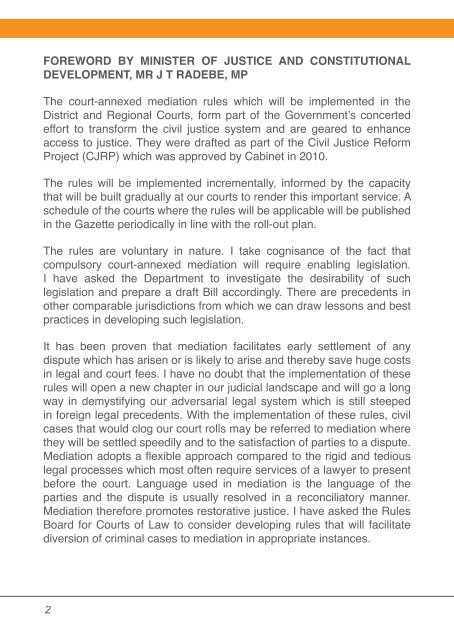Court-Annexed Mediation
DOJ Mediation Rules Booklet
DOJ Mediation Rules Booklet
- No tags were found...
You also want an ePaper? Increase the reach of your titles
YUMPU automatically turns print PDFs into web optimized ePapers that Google loves.
FOREWORD BY MINISTER OF JUSTICE AND CONSTITUTIONAL<br />
DEVELOPMENT, MR J T RADEBE, MP<br />
The court-annexed mediation rules which will be implemented in the<br />
District and Regional <strong>Court</strong>s, form part of the Government’s concerted<br />
effort to transform the civil justice system and are geared to enhance<br />
access to justice. They were drafted as part of the Civil Justice Reform<br />
Project (CJRP) which was approved by Cabinet in 2010.<br />
The rules will be implemented incrementally, informed by the capacity<br />
that will be built gradually at our courts to render this important service. A<br />
schedule of the courts where the rules will be applicable will be published<br />
in the Gazette periodically in line with the roll-out plan.<br />
The rules are voluntary in nature. I take cognisance of the fact that<br />
compulsory court-annexed mediation will require enabling legislation.<br />
I have asked the Department to investigate the desirability of such<br />
legislation and prepare a draft Bill accordingly. There are precedents in<br />
other comparable jurisdictions from which we can draw lessons and best<br />
practices in developing such legislation.<br />
It has been proven that mediation facilitates early settlement of any<br />
dispute which has arisen or is likely to arise and thereby save huge costs<br />
in legal and court fees. I have no doubt that the implementation of these<br />
rules will open a new chapter in our judicial landscape and will go a long<br />
way in demystifying our adversarial legal system which is still steeped<br />
in foreign legal precedents. With the implementation of these rules, civil<br />
cases that would clog our court rolls may be referred to mediation where<br />
they will be settled speedily and to the satisfaction of parties to a dispute.<br />
<strong>Mediation</strong> adopts a fl exible approach compared to the rigid and tedious<br />
legal processes which most often require services of a lawyer to present<br />
before the court. Language used in mediation is the language of the<br />
parties and the dispute is usually resolved in a reconciliatory manner.<br />
<strong>Mediation</strong> therefore promotes restorative justice. I have asked the Rules<br />
Board for <strong>Court</strong>s of Law to consider developing rules that will facilitate<br />
diversion of criminal cases to mediation in appropriate instances.<br />
2


